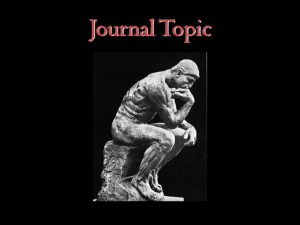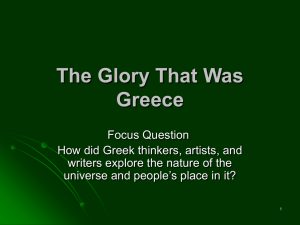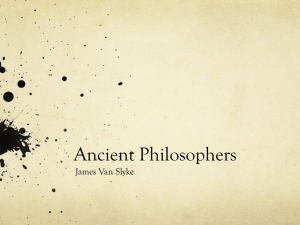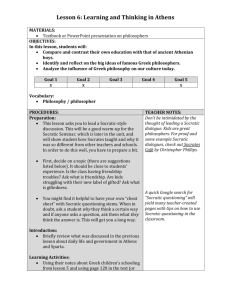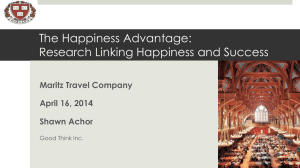GE1102 - Assumption University
advertisement
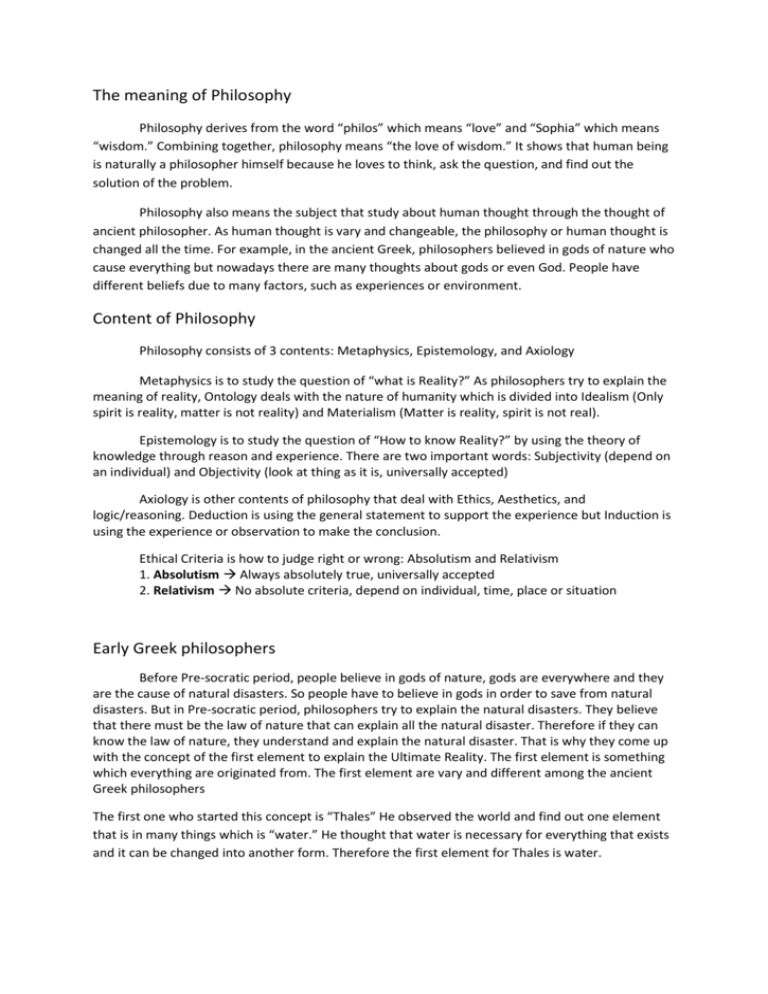
The meaning of Philosophy Philosophy derives from the word “philos” which means “love” and “Sophia” which means “wisdom.” Combining together, philosophy means “the love of wisdom.” It shows that human being is naturally a philosopher himself because he loves to think, ask the question, and find out the solution of the problem. Philosophy also means the subject that study about human thought through the thought of ancient philosopher. As human thought is vary and changeable, the philosophy or human thought is changed all the time. For example, in the ancient Greek, philosophers believed in gods of nature who cause everything but nowadays there are many thoughts about gods or even God. People have different beliefs due to many factors, such as experiences or environment. Content of Philosophy Philosophy consists of 3 contents: Metaphysics, Epistemology, and Axiology Metaphysics is to study the question of “what is Reality?” As philosophers try to explain the meaning of reality, Ontology deals with the nature of humanity which is divided into Idealism (Only spirit is reality, matter is not reality) and Materialism (Matter is reality, spirit is not real). Epistemology is to study the question of “How to know Reality?” by using the theory of knowledge through reason and experience. There are two important words: Subjectivity (depend on an individual) and Objectivity (look at thing as it is, universally accepted) Axiology is other contents of philosophy that deal with Ethics, Aesthetics, and logic/reasoning. Deduction is using the general statement to support the experience but Induction is using the experience or observation to make the conclusion. Ethical Criteria is how to judge right or wrong: Absolutism and Relativism 1. Absolutism Always absolutely true, universally accepted 2. Relativism No absolute criteria, depend on individual, time, place or situation Early Greek philosophers Before Pre-socratic period, people believe in gods of nature, gods are everywhere and they are the cause of natural disasters. So people have to believe in gods in order to save from natural disasters. But in Pre-socratic period, philosophers try to explain the natural disasters. They believe that there must be the law of nature that can explain all the natural disaster. Therefore if they can know the law of nature, they understand and explain the natural disaster. That is why they come up with the concept of the first element to explain the Ultimate Reality. The first element is something which everything are originated from. The first element are vary and different among the ancient Greek philosophers The first one who started this concept is “Thales” He observed the world and find out one element that is in many things which is “water.” He thought that water is necessary for everything that exists and it can be changed into another form. Therefore the first element for Thales is water. At the same time, he encouraged his students to look for better answers until the fixed answer is reached. This is the philosophical style. Then “Anaximander” disagreed with Thales because many elements are not absorbed in water. The first element should be something that is eternal, ageless, boundless, and infinity. So the first element for Anaximander is “Formless Matter (Apeiron)” because formless matter can disposed to accept any kind of form After that, “Anaximenes” thought that formless matter is not understandable. It is nonsense and cannot be proved. He believed that the first element should be an element that can transform into thing. So his Ultimate Reality is the “Air” because people cannot survive unless we breathe air. He explained that air can transform to other objects by the process of condensation (getting colder and become a solid state) and rarefaction (ratify or become warmer and generate heat). These processes give air capable to generate fire, wind, cloud, water, etc. Later on, “Heraclitus” came up with the new answer that “Changing or Becoming” is the Ultimate Reality because he noticed that everything is change during the time. For example, the river that we step in each time is not always the same river because the river flows all the time. As this world is the world of change, Heraclitus let the change itself as the Ultimate Reality. Nothing is permanent, except “change” itself. Therefore, the first element for him is “Fire” because all things are an exchange for Fire. “Parmenides” disagreed with Heraclitus because he thought that becoming and changing is impossible. It is not real nature of all things. Nothing can change and become what they are already are. It is only a part of a continuous process. For example, human cannot change into human because it is already human. However, human can be born, getting old, and die. They can change from one form to another form but they cannot change what they are really are. As a result, he stated that the Ultimate Reality is “Permanent.” Combining the thought together, “Empedocles” stated that the Ultimate Reality is the “Four Elements” which are Earth, Fire, Water, and Air. All things are originated from the combinations of only these 4 elements in different proportions. Finally, “Democritus” developed the theory of Empedocles and stated that the four elements can be reducible into the smallest unit of matter which cannot be reduced anymore. That is “Atom.” Atom is permanent but it has motion because atom has void, so movements and changes are possible. Classical Greek Philosophers Sophists Sophists are those who think they are wise. Compare to nowadays, sophists are lawyer or attorney who can use persuasive speaking. In court, they can say anything to make you right. One of the famous sophists is “Protagorus” his main thought is “Man is the measure of all things.” He believed that everyone have different thought; therefore, they have different reality. So, there is no absolute Ultimate Reality for Sophists because it depends on individuals. Socrates Socrates thought that Sophist’s approach cannot make knowledge or Reality possible because it is only an idea of individuals. However, Socrates believed that there must be a Universal Truth in order to live. He came up with the teaching “Know thyself.” This means knowing about ourselves that knowledge is in our mind but it is limited. For Socrates, knowledge is virtue. So we need to use inductive method of Dialogue to gain knowledge about Universal Truth. Socrates was considered as the smartest man in Greek; however, he claimed that “What I know is that I know nothing.” So he walked and asked the people in Athens who said that they are wise whether they have knowledge or not by using the “Socratic Method of Dialogue” which is to ask questions to find the answer. But No one could answer his questions. This made them so embarrassed. As a result, they accused him that his teaching is against gods. Finally he was force to eat Hemlock, poisonous plant, and died. Plato Plato agreed with Socrates that we must have knowledge in order to know the Truth. So he came up with “The Two World Theory”: World of Idea and World of Form (Visible World). World of Idea (World of Form) is the origin of human knowledge. Everything is this world is transcendental, absolute, reality, universal, and permanent. All things in the world of Ideas are the original form or the universal form of all things in sensible world. World of Material or Visible World is the world where human are in. This is the world of received from. Everything in this world is the copy of those in the world of Idea. Because everything in Visible World is imperfect, people try to be perfect or achieve the perfection of the World of Idea. The way to achieve the perfection is to use the reason and wisdom through the 5 senses and experiences. According to Plato, only 5 senses and experience is not enough to achieve the World of Idea or the Universal Truth. We need to use reason and wisdom too. For example, The Allegory of the Cave, cavemen see the big shadow of the object on the wall and perceive that it is big and awful but it is, actually, a mirage. So they have to use reason and wisdom that the big shadow they have seen is shadow of the object placed in front of the light. If they can find the way to get out of the cave, they will see the world different from what they have seen in the cave and that is the truth. Aristotle Aristotle disagreed with the Two World Theory because it could not explain the cause of motion or the changes in the visible world. He believed that the cause of motion must be sought in things themselves. So he adapted and combined Plato’s theory and stated that World of Idea (World of Form) is in the Visible World because “Forms already exist in matter.” We need experiences and 5 senses to gain knowledge. According to Aristotle, there is a Universal Truth and it is in this world, World of Material or Visible world. He stated that All things in this world are already original, not a copy one. For example people are original. They are not copy of the others. Even thought they are born from father and mother, they are different from their parents. Only some parts or characters of the child are like their parents. Moreover, Aristotle said that “Universal is a common part of particular.” Whatever which is common in human are the Universal but the difference among them are each individual’s original. This can not only apply to human but it can also apply to all things, such as animal or plant. In case of animal, each cat is different of its color, size, or behavior. But it has something in common which is two eyes, one long tail, walking with 4 legs, have claws, etc. These common things are universal but the differences among them are their original. Therefore everything is unique. Another theory of Aristotle is “The Law of Causation” which is 4 causes as the explanation of everything. 1. The Material Cause is the basic stuff or material which everything is made 2. The Formal Cause is the form, size and shape of things 3. The Efficient Cause is something or someone that put the material into the form it is in 4. The Final Cause is the purpose of all things; therefore, everything has purpose Objects or Things Causes Wooden Desk Strawberry Smoothies Automobile The Material Cause Wood, nail Strawberry, ice, water, syrup, milk Steel, Automobile parts, tire, mirror, etc. The Formal Cause Form of table with 4 legs A glass of Pink smoothies with strawberry taste blueprint of car The Efficient Cause Carpenter with skills Blender and glass Machinery and mechanics The Final Cause Wooden Desk for using in the school Strawberry smoothies for drink Automobile as a vehicle Comparison of Classical Philosophers Philosophers Ultimate Reality or Universal Truth Objectivity Subjectivity Ethical Criteria Sophists No, it depends on an individual. Relativism Socrates Use Socratic Method of Dialogue to reveal the Universal Truth Absolutism Plato Yes, it is in the World of Idea (World of Form) Absolutism Aristotle Yes, it is in the World of matter (Forms already exist in Mattter) Absolutism Hellenistic Period In this period, there are a lot of wars such as Persian war and Peloponnesian wars. It is the declining of Greek. Then, Greek belonged to Macedonia. Later on, the war between Macedonia and Persia occurred. Finally Alexander the Great of Persia took control all over Greek. Alexander the Great conquered and expanded territories and also culture. He expanded the Greek culture to Egypt and India. Therefore, Greek culture is mixed with other cultures. That’s why we called it Hellenistic Period. Hedonism Hedonism derived from Greek word “Hedo” means “Pleasure.” This is the school of philosophy which believe that pleasure is the goal of life. If you eat, drink or be married and you feel happy, do it. Because they think that only now and here is sure, tomorrow is never come, they should find the happiness and receive all the opportunity that provide them the happiness. If they refuse the opportunity, tomorrow they may die and cannot experience the happiness anymore. So they had better accept the happiness from any situation. For example, if you are invited to go to the party or any special occasion, according to the teaching of Hedonism, you should go and enjoy the moment of happiness by eating and drinking as much as you can as if today is the last day of your life. The way to gain the happiness for Hedonism is through 5 senses and experiences. 1. Eye see beauty 2. Ears hear beautiful sound 3. Nose smells good fragrance 4. Tongue taste delicious feed 5. Body touch softness Epicureanism This is the philosophy based on the teaching of “Epicurus”. It considered as Hedonism that we should find the happiness or pleasure for our life. However, Epicurus believed that here and now is sure but tomorrow or the future also sure, unlike Hedonism that the future is not sure. Epicurus focused on the longest happiness. So, he believed that we should seek the happiness or pleasure at the present time and try to avoid pain in order to save our life for the next happiness that will come in the future. The Ultimate Reality for Epicurus, influenced by Democritus, is Atom and Void. Moreover, he believed that faith in God is a result of “Human Imagination.” Cynicism Cynicism believed that man should delete all passion and wealth, then practice the “simplest live.” Cynicism derived from the Greek Word for “dog”. So, people should live like a dog. Dog does not store food for tomorrow. To gain happiness, Cynicism avoids all the necessary things and lives as simple as they can. This is influence by Socrates, who valued Virtue and cared little for wealth and accepted opinions. Stoicism Stoicism named from the person name “Stoic.” His business ship sunk, so he lost his business. He began to study cynicism. But living like a dog did not help him to have the best life. Stoic, also, did not believe that pleasure could bring him the best life. So he believed that he should do only necessary things which are good and right. He also believed that “One does your duty because duty commands you to do it, not because of the consequence might bring.” It means that we do not do good things for expecting something back but we do it because it is the duty to do. Comparison of Hellenistic Philosophy Philosopher Hedonism Epicureanism Cynicism Stoicism Goal Pleasure Pleasure Inner peace Inner peace Practice Seek happiness only for today Seek happiness for today and save life for tomorrow delete passion and live like a dog Do only what is good and right How to gain knowledge? 5 senses 5 senses wisdom wisdom Medieval Period In this period, Philosophical thought declined because there were a lot of wars. Social system became more hereditary and feudalism. Christianity became dominant and it was called The Dark Age. During this period, Jesus was already born and Christianity had a great impact on philosophy. So philosophy and religion during the medieval period ware dealing with the existence of God. There are two important philosophers during this period. St. Augustine He was the one who brought back the philosophy from Greek. He was influenced from Plato. He believed that human should use reason to achieve the Ultimate Reality. However the Ultimate Reality for St. Augustine is God. Unlike Plato, there was no God at Plato’s period. Therefore, according to St. Augustine, in order to know the Ultimate Reality which is God, we should use the reason. St. Thomas Aquinas He was influenced by Aristotle. He believed that knowledge came from 5 senses, experiences, and observation. This method must be used in order to know God. According to St. Thomas Aquinas, he explained the reason why God exists; 1. God exists as the first mover. The world is moving but it cannot move itself. There must be someone who makes the world in motion. That person is God. 2. God exists as the 1st cause. Everything has cause and the one who cause it is God. 3. God is necessarily exists. He must be there for future emergency. 4. God exists to be the perfection. Everything in the world is imperfect. There must be someone who is perfect, so that everyone can participate his perfection. That person is God. 5. God exists as an ordinator. He is the one who make the world in order. Modern Age In this period, there are two approaches which are Consequences and Means. The philosopher who thought that consequence is more important is John Stuart Mill. In the opposite, Immanuel Kant thinks thought that means is more important. John Stuart Mill He is considered as Utilitarianism. He believed in “Greatest Happiness for the Greatest Numbers.” That means everyone must do anything for the sake of the majority. The morality or good depend on the degree of happiness of majority. His thinking seems to encourage people to emphasize on the majority rather than oneself. For example, if one wants to donate some money for somebody. There are 3 choices: donate money for building the school in rural area, buy food and cloth for AIDs patients, or building the house for street dog. According to Utilitarianism, one should donate money for building the school in rural area because it can expand the education to the rural area. Therefore, it provides jobs for teachers and education for students. Eventually those students can use their knowledge to serve the society in the future. Immanuel Kant Opposite to John Stuart Mill, Immanuel Kant emphasize on mean or method rater that the consequence. He believed in “Duty for Duty Sake.” So he came up with “Kantian Ethics of Deontological” which are: 1. Moral principle must hold universally. Everyone must make the decision based on the moral principle or rules. 2. Reason alone can deliver knowledge of principles that hold universally as duties. 3. Duties to do good. People do good things because it is duty, not emotion. 4. Categorical Imperatives Comparison between John Stuart Mill and Immanuel Kant John Stuart Mill Immanuel Kant Consequence (Focus on result) Mean (focus on method) Relativism Absolutism Morality is Happiness Morality is Universal law
